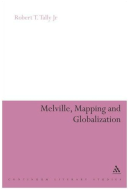Melville, Mapping and Globalization: Literary Cartography in the American Baroque Writer (London & New York: Continuum, 2009).

In Melville, Mapping and Globalization, Robert Tally argues that Melville does not belong in the tradition of the American Renaissance, but rather creates a baroque literary cartography, artistically engaging with spaces beyond the national model. At a time of intense national consolidation and cultural centralization, Melville discovered the postnational forces of an emerging world system, a system that has become our own in the era of globalization.
Drawing on the work of a range of literary and social critics (including Deleuze, Foucault, Jameson, and Moretti), Tally argues that Melville’s distinct literary form enabled his critique of the dominant national narrative of his own time and proleptically undermined the national literary tradition of American Studies a century later. Melville’s hypercanonical status in the United States makes his work all the more crucial for understanding the role of literature in a post-American epoch. Offering bold new interpretations and theoretical juxtapositions, Tally presents a postnational Melville, well suited to establishing new approaches to American and world literature in the twenty-first century.
Praise for Melville, Mapping and Globalization:
“In Melville, Mapping and Globalization: Literary Cartography in the American Baroque Writer, Robert Tally, unlike the vast majority of his predecessors, refuses the temptation to domesticate Herman Melville’s polyvalent literary excesses. Instead he goes all out to think them positively. The result is a major contribution to the New Americanist effort to reconstellate Melville’s work out of the American nationalist context where it has been mired into the global context where it has always belonged.”
— Distinguished Professor William V. Spanos, Binghamton University
Drawing on the work of a range of literary and social critics (including Deleuze, Foucault, Jameson, and Moretti), Tally argues that Melville’s distinct literary form enabled his critique of the dominant national narrative of his own time and proleptically undermined the national literary tradition of American Studies a century later. Melville’s hypercanonical status in the United States makes his work all the more crucial for understanding the role of literature in a post-American epoch. Offering bold new interpretations and theoretical juxtapositions, Tally presents a postnational Melville, well suited to establishing new approaches to American and world literature in the twenty-first century.
Praise for Melville, Mapping and Globalization:
“In Melville, Mapping and Globalization: Literary Cartography in the American Baroque Writer, Robert Tally, unlike the vast majority of his predecessors, refuses the temptation to domesticate Herman Melville’s polyvalent literary excesses. Instead he goes all out to think them positively. The result is a major contribution to the New Americanist effort to reconstellate Melville’s work out of the American nationalist context where it has been mired into the global context where it has always belonged.”
— Distinguished Professor William V. Spanos, Binghamton University
